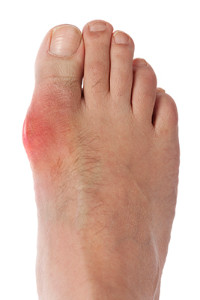Lansing (517) 321-1199

 People who experience gout flare ups are aware of the severe pain and discomfort that often accompanies these attacks. It will typically affect the big toe, and common symptoms can include redness, swelling, and tenderness. A medical condition that is referred to as hyperuricemia can occur if there is excess uric acid in the bloodstream. This can happen for a variety of reasons, including having high blood pressure, being diabetic or obese. There are specific foods that have elevated purine levels, and if these are consumed, a surplus of uric acid levels may form in the blood. These can include red meat, shellfish, and foods or drinks that have excess sugar. There are methods that can be implemented which may help to prevent gout attacks. These consist of changing your eating habits to incorporate healthy foods, performing a gentle exercise routine, and to lose any existing additional weight. If you are afflicted with gout, it is suggested to speak with a podiatrist who can properly help you to manage this condition.
People who experience gout flare ups are aware of the severe pain and discomfort that often accompanies these attacks. It will typically affect the big toe, and common symptoms can include redness, swelling, and tenderness. A medical condition that is referred to as hyperuricemia can occur if there is excess uric acid in the bloodstream. This can happen for a variety of reasons, including having high blood pressure, being diabetic or obese. There are specific foods that have elevated purine levels, and if these are consumed, a surplus of uric acid levels may form in the blood. These can include red meat, shellfish, and foods or drinks that have excess sugar. There are methods that can be implemented which may help to prevent gout attacks. These consist of changing your eating habits to incorporate healthy foods, performing a gentle exercise routine, and to lose any existing additional weight. If you are afflicted with gout, it is suggested to speak with a podiatrist who can properly help you to manage this condition.
Gout is a painful condition that can be treated. If you are seeking treatment, contact Dr. Harold Sterling from Michigan. Our doctor will treat your foot and ankle needs.
What Is Gout?
Gout is a form of arthritis that is characterized by sudden, severe attacks of pain, redness, and tenderness in the joints. The condition usually affects the joint at the base of the big toe. A gout attack can occur at any random time, such as the middle of the night while you are asleep.
Symptoms
Risk Factors
Prior to visiting your podiatrist to receive treatment for gout, there are a few things you should do beforehand. If you have gout you should write down your symptoms--including when they started and how often you experience them, important medical information you may have, and any questions you may have. Writing down these three things will help your podiatrist in assessing your specific situation so that he or she may provide the best route of treatment for you.
If you have any questions, please feel free to contact our office located in Lansing, MI. We offer the newest diagnostic and treatment technologies for all your foot care needs.
Read more about Gout